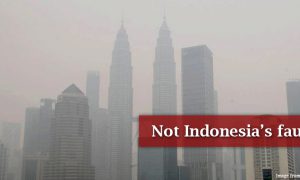Malaysia’s movement control closed down all schools. So why hasn’t Singapore done so?
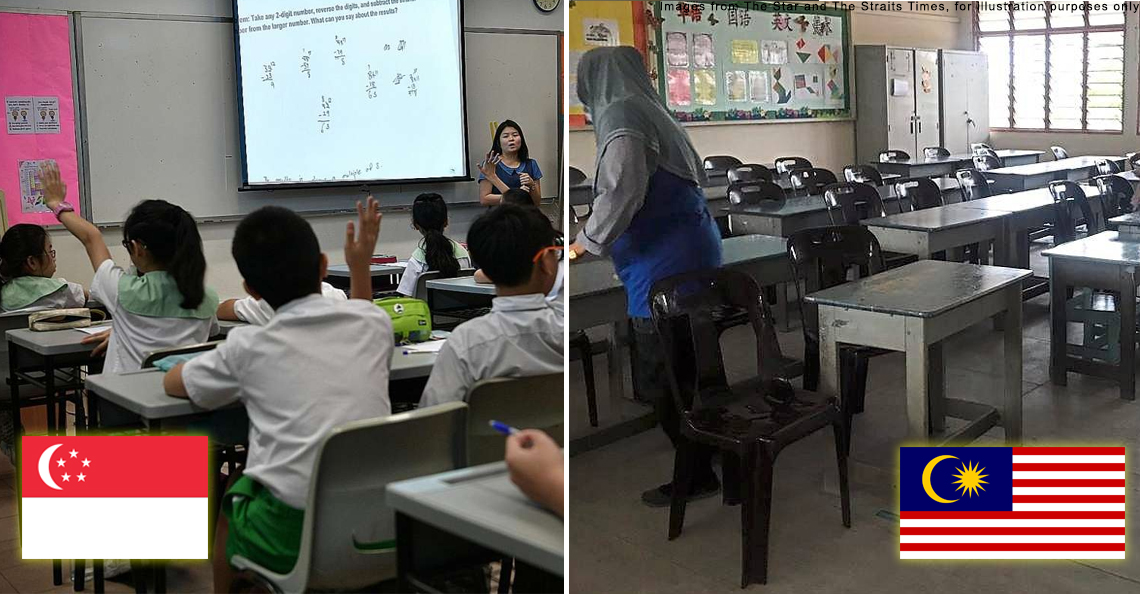
- 661Shares
- Facebook632
- Twitter4
- LinkedIn3
- Email2
- WhatsApp20
Malaysia’s seen a drastic rise in in Covid-19 cases recently, with what some has called the second wave of Covid-19 cases hitting the nation. At the time of writing, we have 790 Covid-19 cases, which is a far cry from the 29 cases as of the 1st of March, 2020.
In light of the rapid spread of the virus, our Prime Minister Muhyiddin Yassin ordered a 14-day Movement Control Order, or a partial lockdown, on the night of 16th of March. It’s meant to decrease the chances of the virus spreading any further than it has now.

Headline from The Star
So here’s how our Movement Control Order works:
- A ban on all religious, sporting, social, and cultural gatherings
- All business and religious premises to close, with exemptions on grocery stores, public markets, convenience stores, and pharmacies
- Nationwide travel restrictions on all citizens – if you’ve just arrived from abroad, you’re to undergo a 14-day self quarantine
- All tourists and visitors are not allowed to enter Malaysia
- All public and private schools to close, including kindergartens, nurseries, private and public schools, and higher institutions
- All government and private premises to close, except important services like water and electricity, telecommunication, postal service, transport, fuel, gas, lubrication, broadcasting, banking, health, pharmacy, firefighting, ports, airports, prisons, security and defense, sanitary services, provision, and food supply
- No one’s allowed to travel between states, except for food, healthcare, and essentials, without police permission
But um, Malaysia’s actually not the only country under movement restrictions, as Italy, Spain, Philippines, Thailand, and Singapore have also announced their own versions of movement restrictions previously. But today, we’re gonna talk more about Philippines, Singapore, and Thailand, and see how their movement restrictions compare to ours, mainly because they’re the countries in the Southeast Asian region to have implemented serious movement restrictions so far, and also they’re kinda closer to us compared to the rest of the world.
Philippines – Overseas plan? Cannot.
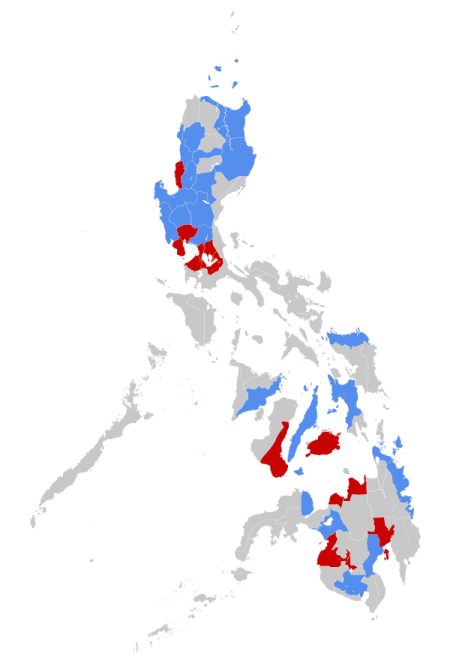
Areas with suspected (blue) and confirmed (red) cases in Philippines. Image from Wikipedia
Philippines recorded its first Covid-19 case on the 30th of January, 2020, and then two days later, a Filipino died from the disease, making it the first Covid-19 death outside of China. However, even then, confirmed cases were few and far between, where there was a time when they hadn’t even reported any new cases for two whole weeks.
But then things kinda took downturn in March, when the Filipino government reported new cases almost everyday from the 5th to 12th, totalling up to 52 cases at the time. And that led to President of the Philippines Rodrigo Duterte declaring a state of Public Health Emergency (PHE), and placing half the country on community quarantine for 30 days, beginning from 15th of March, 2020.
“The outbreak of COVID-19 constitutes an emergency that threatens national security, which requires a whole-of-government response.” – Duterte, as quoted by Vice
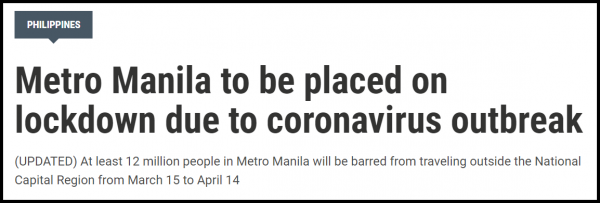
Headline from Rappler
The community quarantine in Philippines essentially affects 16 cities and one municipality in its capital region Metro Manila, all of which consists of around 50million people. This was recommended by the Filipino Inter-Agency Task Force (IATC) that was created to manage the Covid-19 outbreak in the country.
“We don’t want to use the term lockdown because it intimidates you. But it’s a lockdown. There’s no struggle of power here. It’s a matter of protecting and defending you from Covid-19.” – Duterte, as quoted by Inquirer.Net
The community quarantine works like this:
- Nobody can enter or leave Metro Manila, either via land, domestic air, or sea travel
- Travelers from countries impacted by Covid-19 are not allowed to enter Philippines, unless they’re a Filipino citizen, spouse or children of a Filipino, permanent resident, or has a diplomat visa
- Schools on all levels are suspended throughout the lockdown
- Big gatherings are banned
- All public activities in churches are suspended, and people are encouraged to watch masses broadcast on TV
- Public transport will continue operations
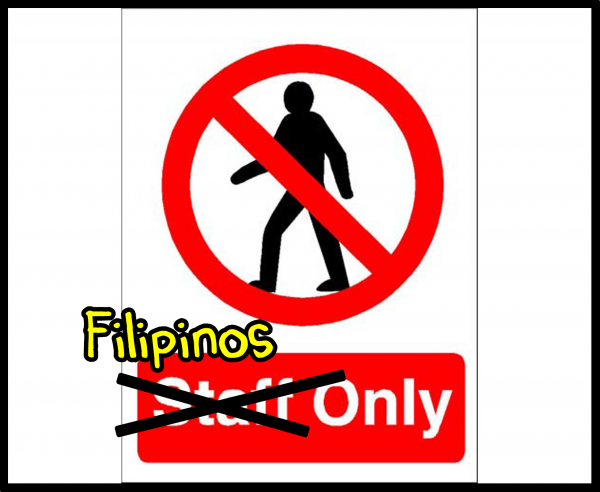
Basically. Unedited Image from Pinterest
While these guidelines supposedly only apply to Metro Manila, other regions are also recommended to place themselves under voluntary community quarantine if found to have at least two Covid-19 cases in the territory.
But, keep in mind that the lockdown was announced on the 12th of March, because only days later, things in Philippines had taken another drastic change and the cases rose to 187 as of 17th of March. On the same day, Duterte had announced a “state of calamity” in Philippines, due to the continuous rise of Covid-19 cases even after the lockdown. Unlike the lockdown, a state of calamity lasts six months.
There are no specifics as to how the state of calamity will be carried out, but Duterte’s also started employing the military and armed forces to ensure peace and order in affected areas. The Filipinos have been warned that if they don’t follow the restrictions placed under the lockdown, they’d be arrested and might even be looking at jail time.
Thailand – Overseas plan? Still can.
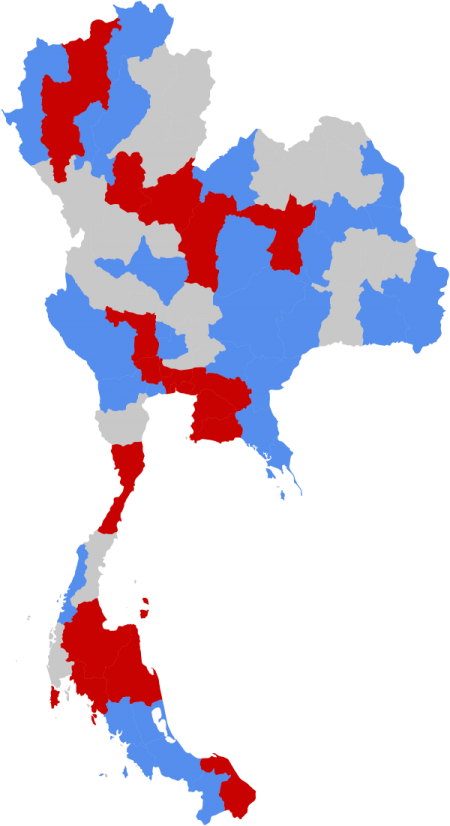
Areas with suspected (blue) and confirmed (red) Covid-19 cases in Thailand. Image from Wikipedia
The first case of Covid-19 in Thailand was reported on the 13th of January, 2020 – the patient’s actually a visitor from China. And things hadn’t been cooling down since then, as the country seemed to be reporting confirmed Covid-19 cases on a daily basis, until the number of cases has reached 177 as of 17th of March, 2020. Then on the 1st of March, Thailand’s Health Ministry announced its first Covid-19 related death.
And apparently, according to a study by the University of Southampton, Thailand’s placed at the top of a list of high-risk countries from Covid-19.
Initially, the Prime Minister of Thailand Prayut Chan-o-cha had insisted that there would be no lockdown at the moment, despite the rapid rise of cases within the country. However, as of Tuesday this week, the Thai government’s announced something that kinda resembles a lockdown, which is that:
- All venues that tend to be crowded to be closed, including bars, boxing rings, and entertainment venues
- All schools and universities to be closed for two weeks, starting 18th of March
- Tourist arrivals from Covid-19 hotspots have been suspended
- Big gatherings, such as concerts and religious activities, will need approval of authorities
- Popular water festival Songkran is canceled until further notice

No splashing. GIF from Giphy
However, the things listed above don’t apply to seaside resorts, so it’s not exactly a lockdown, but something along the lines of one.
“…no complete city or country lockdown yet. We’re reducing the chance of the disease spreading in high-risk places by closing them.” – Chan-o-cha, as quoted by India Today
On top of that, on the same day, the Buriram province in Thailand’s also imposed a partial lockdown. The province governor said that it was necessary measure to protect the people, even though no Covid-19 cases had been reported in the area.
So compared with the rest of Thailand, things are kinda different in Bruriram, where serious lockdown measures are implemented, such as screening all local and foreign arrivals at entry points, a tracking system for all non-residents through their stay, and cancellation or postponement of group activities.
Singapore – Overseas plan? Can, but better not la
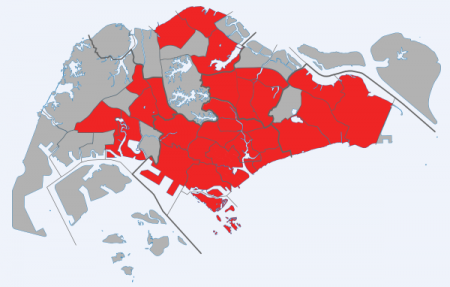
Areas with confirmed (red) Covid-19 cases in Singapore. Image from Wikipedia
Our friendly neighbor Singapore saw its first case of Covid-19 on the 23rd of January, 2020, only two days before Malaysia recorded its first case. They’ve actually been doing a pretty decent job on containing the disease, up to the point where 78 out of 108 patients managed to recover as of the 2nd of March, 2020.
“Singapore is a good example of an all-of-government approach – Prime Minister Lee Hsien Loong’s regular videos are helping to explain the risks and reassure people.” – World Health Organization chief Dr. Tedros Adhanom Ghebreyesus, as quoted by The Straits Times
But around the same time as when Malaysia saw a second wave of Covid-19 cases, so did Singapore. On the 17th of March, Singapore’s Health Ministry reported a total of 23 new Covid-19 cases, marking the highest number of cases in a single day in the country and bringing Singapore’s total up to 266.
“But in the last few days, we have seen some cases which cannot be traced to the source of infection. These worried us, because it showed that the virus is probably already circulating in our own population.” – Prime Minister of Singapore Lee Hsien Loong, in a statement
This led to the Singaporean government raising the local Disease Outbreak Response System Condition (DORSCON) from yellow to orange, which means the government is taking more stringent measures to contain the virus. But despite all that, Singapore has not yet been put under a lockdown.
Instead, the Singaporean government’s implemented a number of strict travel and movement restrictions as an attempt to contain the spread of the disease, which are:
- 14-day stay-at-home notice for those who’ve recently traveled to ASEAN countries, the UK, Japan, and Switzerland
- All work-pass holders with travel history to affected countries must obtain approval from the Ministry of Manpower
- Short-term visitors to Singapore must submit health information to the Singapore Overseas Mission in their respective countries
- Visitors without approval will be denied entry to Singapore
- All Singaporeans are advised to defer all non-essential travel abroad
As you can see, Singaporeans are still allowed to leave their homes and take a walk in Geylang for reasons, they’re just advised to not travel abroad. Their schools are also still operating, but that’s only because children are generally asymptomatic or have mild disease and don’t easily contract the virus. As such, the feeling in Singapore has been that schools don’t necessarily have to close down just yet as they want life to remain as normal as possible. In fact, according to Dale Fisher, Chair of Infection Control in National University of Singapore:
“In Singapore, we want life to go on as normal. We want businesses, churches, restaurants and schools to stay open. This is what success looks like. Everything goes forward with modifications as needed, and you keep doing this until there’s a vaccine or a treatment.” – Dale Fisher, as quoted by The Conversation

GIF from Tenor
Though Singapore isn’t under lockdown currently, their National Development Minister Lawrence Wong isn’t ruling it out, depending on the situation.
“We have always said that we need to consider a whole range of measures and not rule anything out.” – Wong, as quoted by Yahoo News
However, while Singapore itself isn’t under lockdown, Malaysia’s recently announced Movement Control Order has significant impact on it, especially for Malaysians who are working in Singapore, and Singapore’s doing all it can to mitigate the effects. For one, the government is arranging temporary and subsidized living arrangements for Malaysian workers in Singapore. In addition, the Singaporean government’s ensured that food supply there won’t be affected by our Movement Control Order
When you compare all these measures taken by ASEAN countries so far, in terms of travel restrictions and movement controls…
Malaysia seems second only to Philippines in restricting movement

Headline from CNN
See, when compared to Singapore and Thailand, Malaysia and Philippines are a tad more strict in terms of quarantine, travel, and movement restrictions, where we actually restrict overseas travels and such.
The only difference is that Duterte’s declared that Philippines is under lockdown and we only have a Movement Control Order. The thing is though, our country’s not the only one facing a rapid and sudden spread of Covid-19 virus, as other Southeast Asian countries are facing something similar as well, like Indonesia and Singapore.
And the Movement Control Order’s not necessarily a bad thing, since Malaysia actually has the highest confirmed Covid-19 cases, soaring to 790 in total at the time of writing, when compared with Singapore, Thailand, and Philippines. On top of that, Malaysia’s also recorded two Covid-19 related deaths on the 17th of March. So it’s really no joke.
Even the WHO itself has called for more aggressive measures to be taken in Southeast Asian countries to combat the virus.
“More clusters of virus transmission are being confirmed. While this is an indication of an alert and effective surveillance, it also puts the spotlight on the need for more aggressive and whole of society efforts to prevent further spread of Covid-19.” – WHO regional director Poonam Khetrapal Singh, as quoted by NST
So it’s nice to see that Malaysia’s actively trying to contain Covid-19, going as far as closing our borders. In the meantime, while our borders are closed, you can also do your part, like washing your hands and staying at home. You can also clear up any confusion you have about the Movement Control Order by referring to the government’s FAQ here. For example, if you’re brave enough to not follow the Movement Control Order, you can easily face a jail time of up to five years or get slapped with a hefty fine.
Oh, and also, just to make it clear, at time of writing our supermarkets and grocery stores are still open, and we’re still allowed to head out and buy groceries, so perhaps it’s time to calm down and leave some stuff for the less able-bodied people.
- 661Shares
- Facebook632
- Twitter4
- LinkedIn3
- Email2
- WhatsApp20





